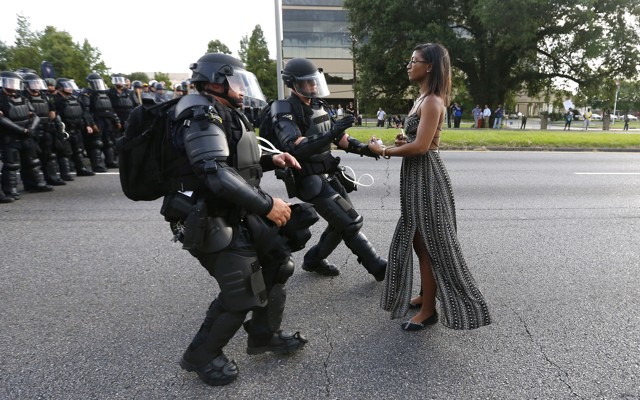I had a title, but not a post, for a few days: Black and Blue. Like a bruise. Like the result of battering. A domestic abuse.
But I had nothing new to say. I felt like a voyeur. Watching the videos, scanning the photos from the comfort/discomfort of my couch, on my laptop.
Perhaps most memorable for me, this one, taken by Jonathan Bachman of Reuters:


A young Black woman, standing tall and straight, bold and powerful, being handcuffed. White officers in full riot gear. Destabilized. Why do they need to approach this unarmed woman this way? How much is this like the initial moments of colonization and slavery? How can they see her as a threat? And yet, they do.
Is this, as Michelle Alexander writes, our mirror? Will this be enough? Will it disturb us enough?
My neighbors went to a Black Lives Matter protest in Trenton last night. I was home with two kids who were not going to a protest. Part of me has been looking for a protest, and another part of me, like this woman, wonders, what the fuck is a protest going to do? We can march all we want; what is really going to change? How many times will we lose energy, and forget?
I watched protest video footage from Baton Rouge. I wanted to reach through the screen and pull those people to safety, here in my living room.
Our students, this past year, occupied the University President's office, telling him they wouldn't leave until he agreed to their demands. He did, eventually. Or at least, agreed to consider them. Which, of course, wasn't really the same thing at all. Why did he agree? Because he believes that the institution he leads is a fundamentally racist institution? I doubt that, though I know his heart is in the right place, and I'm sure that he realizes the institution will need to change and evolve and respond during the next few years. Will our students return to their protests this year, knowing that they haven't achieved their goals?
Beyond our campus, where do we sit in? Whose office do we occupy? What do we demand? Not more task forces. Not more committees. Yes, justice. Accountability. But more. So much more.
What counts as a crime? Who gets stopped, imprisoned? How do we make sure that our measures are equal, regardless of the color of our skin?
Who gets to live in places that are clean and safe and bright and affordable?
Who gets access to a good education, good jobs?
Who gets a chance in this nation of opportunity?
We can approach each other -- black, white, brown, blue -- with open hearts, but how do our open hearts create equality? We encourage our students to meet each other with civility, with respect, but how can we change lifetimes of wrongs before someone else has to die?
Maybe there are lessons to be learned here. That domestic abuse can stop. That abusers can redefine what it means to be masculine, that they can begin to see their partners as partners, not as threats. That we can find ways to support both abusers and survivors. That we can offer hope. That we can heal our broken and bruised political body.
Because the alternative is too much for our nation, and for us all, to bear.
For Tamir Rice, Ousmane Zongo, Rekia Boyd, Walter Scott, Eric Garner, Kajieme Powell, Samuel DuBose, Laquan McDonald, Sandra Bland, Oscar Grant, Sean Bell, Kayla Moore and Tanisha Anderson. For Michael Smith, Lorne Ahrens, Michael Krol, Patrick Zamarripa, and Brent Thompson, who were there to protect that day, and who, I have to believe, shared the conviction that #Black Lives Matter.

As always, such a thoughtful post.
ReplyDeleteThe state of our country right now is truly sickening. And like you I'm seeing some of the effects of that in conversations on campus.
I also wonder about the viability of protests and the usefulness of other strategies. For me, it's always about what happens in the classroom and creating--as much as I can--a safe space for dialogue.
You've given me much to think about, and even better, some hope. Hope that people can change, can take more personal responsibility, can become better individuals and citizens.
ReplyDeleteThat image is so powerful.
Been reflecting a lot on this post. All of this came on he heels of a court case, which dragged out a decade of trauma. Seeing the police and hearing the accounts has left me reeling.
ReplyDeleteWe know that prejudice and hate are born out of fear and anger. That so many who chose to hate do so because they feel betrayed or in danger to do otherwise. And yet the words and teachings of Dr. King seem forgotten by so many. Though clearly not on that brave young woman. May she be a symbol for why love needs to win.
People will change their attitude and eventually become peaceful provided they are exposed to the lessons of spirituality. Nowadays, violent video games, movies and college atmosphere are making people more aggressive. By controlling the guns we can somewhat reduce the criminal activities. But we need guns to protect ourselves too.
ReplyDelete